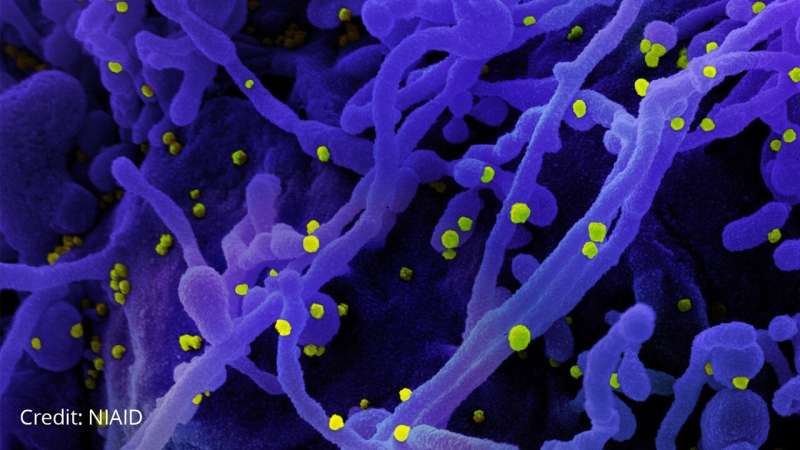Surrogate coronavirus may help researchers discover therapies and vaccines

To study the potentially lethal coronavirus, Albert Einstein College of Medicine scientists have turned a relatively harmless virus into a coronavirus "surrogate" that is much safer to work with. The research was described this month in Cell Host & Microbe.
"Research on the 'real' coronavirus is limited by the fact that it must be done using protective biosafety level 3, or BSL3, laboratories," said Kartik Chandran, Ph.D., the study's co-senior author and professor of microbiology & immunology and the Harold and Muriel Block Faculty Scholar in Virology. "By contrast, our surrogate coronavirus can be studied in BSL2 labs, which are much more widely available."
The surrogate coronavirus "is a great system for safely studying precisely how the coronavirus invades cells and for devising strategies to prevent infection from occurring," said co-senior author Rohit Jangra, Ph.D., research assistant professor of microbiology & immunology. "It could also speed efforts to evaluate potential treatments and vaccines."
Creating a Safer Version of Coronavirus
The surface of the coronavirus is studded with spike-like proteins that give the virus a crown or corona-like appearance—hence the name coronavirus. But far from being mere decorations, the spikes are vital for infection: they enable the virus to latch onto and enter cells and multiply inside them. Moreover, antibodies that do the best job of neutralizing the coronavirus, (i.e., prevent it from infecting cells) are those that target the spikes.
To create their surrogate coronavirus, Drs. Chandran, Jangra, and two research fellows in the Chandran Lab, M. Eugenia Dieterle, Ph.D., and Denise Haslwanter, Ph.D., began with a relatively safe virus: a weakened form of vesicular stomatitis virus (VSV), known for infecting cattle and other farm animals and causing temporary symptoms including weakness and fever. (VSV infections in humans usually cause only mild symptoms.)
The researchers transferred the gene that codes for spike protein into VSV, causing spikes to sprout from VSV's surface. They then conducted experiments showing that their genetically engineered VSV mimicked the behavior of the "real" coronavirus in key respects.
A Successful Surrogate for Scientific Study
As with the coronavirus, the researchers found that the surrogate virus infected human airway cells. And just like the coronavirus, infection with the surrogate virus required the presence of particular receptors called ACE2 on cells; the spike proteins latch onto those receptors to initiate infection. In addition, the surrogate coronavirus could be neutralized by antibodies in the plasma of recovered COVID-19 patients.
Parallel studies using the real coronavirus were conducted by a team at the U.S. Army Medical Research Institute of Infectious Diseases at Fort Detrick, MD, led by co-senior author Andrew S. Herbert, Ph.D., and John M. Dye, Ph.D. Importantly, those studies showed that the surrogate virus closely resembled the behavior of the real coronavirus.
"The surrogate coronavirus can substitute for the real thing for studying how coronaviruses enter cells to start an infection," said Dr. Chandran. "We're optimistic that studies using the surrogate will reveal some of the molecular mechanisms involved in coronavirus infection—knowledge that we could use to develop drugs that block infection and protect against disease."
The Chandran Lab's surrogate coronavirus has already proven its worth. In a clinical trial at Montefiore Health System, blood plasma donated by people who have recovered from COVID-19 is being transfused into patients with COVID-19 and evaluated as a treatment. To be effective, transfused "convalescent plasma" must contain antibodies capable of neutralizing coronavirus and curbing infection. To test for the presence of neutralizing antibodies, Dr. Chandran's team combines plasma samples with the surrogate virus, then pours the mixture onto cells in tissue culture. Plasmas able to protect the cells from infection are then used for transfusion.
In addition, Dr. Chandran and researchers worldwide are evaluating the thousands of different antibodies in the plasma of people who have recovered from COVID-19, looking for antibodies that excel at neutralizing the coronavirus. The goal is to develop the best neutralizers into monoclonal antibodies, which can be produced in large quantities to treat patients with COVID-19. At Einstein, Dr. Chandran's team is assessing antibodies' neutralizing ability by testing them against the surrogate coronavirus.
After evaluating hundreds of antibodies this way, the researchers have found several that are especially potent. "The hope is that, collectively, the scientific community will be able to identify several of these antibodies as therapies, because the need is quite severe and is likely to continue for some time," said Dr. Chandran.
The coronavirus surrogate may also prove useful for other purposes. "As testing of COVID-19 vaccines ramps up," said Dr. Chandran, "there will be a huge demand for assays that can be conducted in BSL2 facilities to assess the immune response those vaccines generate in animal models and humans."
This study is titled "A replication-competent vesicular stomatitis virus for studies of SARS-CoV-2 spike-mediated cell entry and its inhibition."
More information: M. Eugenia Dieterle et al. A replication-competent vesicular stomatitis virus for studies of SARS-CoV-2 spike-mediated cell entry and its inhibition, Cell Host & Microbe (2020). DOI: 10.1016/j.chom.2020.06.020



















